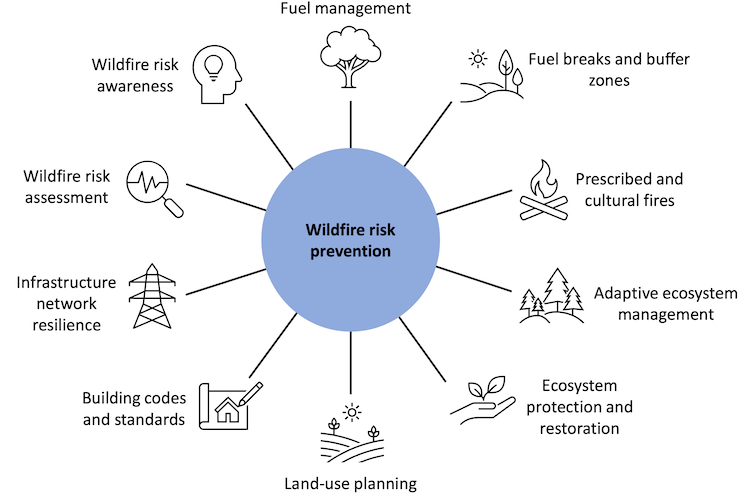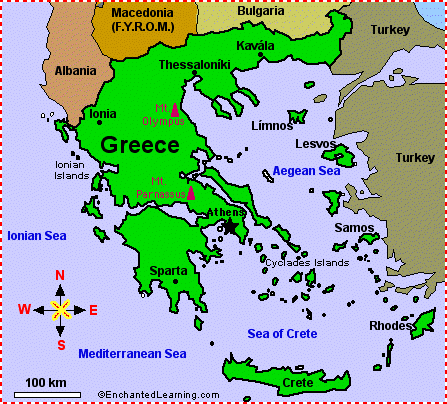GREECE

Disclaimer: Copyright infringement not intended.
Context
The recent wildfires on the Greek island of Rhodes and highlights the role of climate change in heightening wildfire risks in the Mediterranean region.
Details
- Recent wildfires on the Greek island of Rhodes fueled by strong winds and record temperatures, rapidly spreading from the interior to the densely populated coastline.
- The role of climate change in heightening wildfire risks cannot be ignored, with the world being 1.2°C warmer on average than in pre-industrial times.
- More frequent heatwaves and droughts in the Mediterranean region have made the environment more fire-prone, leading to greater disaster risk.
Fire Weather Index in the Mediterranean
- Scientists use a fire weather index to estimate vegetation flammability based on temperature, humidity, wind speed, and recent rainfall.
- The Mediterranean experiences an increased frequency of extreme values on this index, making it more susceptible to wildfires.
- Greece recently faced extreme fire weather conditions due to a heatwave that would have been much less likely in the pre-industrial climate.
Climate Change and Wildfire Predictions
- The UN Environment Programme predicts up to a 14% increase in extreme wildfires by 2030 and 50% increase by 2100 due to climate change.
- Even with the Paris Agreement's 1.5°C warming threshold, a 40% greater area is expected to burn in the Mediterranean.
Causes of Wildfires
- Wildfires require an ignition source like a spark or lightning; climate change alone cannot ignite a fire.
- Arson is a minor cause of wildfires in Greece, with most wildfires originating from farmland fires or intentional burning to manage vegetation.
Addressing Wildfire Risks

Disclaimer: Copyright infringement not intended.
- Adapting and living with fire in naturally fire-prone landscapes is crucial, alongside preparing for more extreme fires in the future.
- Historic wildfire budgets have prioritized firefighting, while prevention efforts should be increased.
- Developing better early-warning systems, evacuation plans, and fire-resistant buildings is essential.
- Promoting fire safety awareness and stopping arson and accidental ignitions can reduce risks.
- Controlled burns during safe weather windows can help manage vegetation density and fuel for wildfires.
The Way Forward
- The wildfires in Greece emphasize the threat of climate change and the importance of meeting emission reduction targets.
- Decisive action to curb emissions, manage fuels, and prepare communities can lower future wildfire risks.
About Greece

Disclaimer: Copyright infringement not intended.
- Greece is located in southeastern Europe, bordered by Albania, North Macedonia, Bulgaria, and Turkey, with the Aegean Sea to the east and the Ionian Sea to the west.
- The country consists of a mainland and numerous islands, including Crete, Rhodes, and Santorini, forming a part of the Mediterranean region.
Historical Significance
- Greece is renowned for its rich history and is often considered the cradle of Western civilization.
- Ancient Greece was the birthplace of democracy, philosophy, and the Olympic Games, leaving a lasting impact on modern culture, art, and literature.
Greek Mythology and Gods
- Greek mythology plays a significant role in the country's cultural heritage, with numerous myths and legends revolving around gods like Zeus, Hera, Athena, and Poseidon.
- The myths have inspired countless works of art and literature throughout history.
Greek Architecture
- Greece is celebrated for its distinctive ancient architectural styles, including the iconic columns of the Doric, Ionic, and Corinthian orders.
- The Acropolis in Athens is a famous example of Greek architecture, housing the Parthenon and other ancient structures.
Beautiful Landscapes and Islands
- Greece boasts diverse landscapes, from stunning beaches along the Mediterranean coast to mountainous regions like Mount Olympus, the mythical home of the gods.
- The Greek islands are renowned for their picturesque beauty, attracting tourists from around the world.
Mediterranean Cuisine
- Greek cuisine is well-known for its delicious and healthy Mediterranean diet, incorporating olive oil, fresh vegetables, grains, and herbs.
- Iconic dishes include moussaka, souvlaki, Greek salad, and baklava.
Religion and Festivals
- The predominant religion in Greece is Eastern Orthodox Christianity, with significant religious festivals celebrated throughout the year.
- Easter is one of the most important religious celebrations, with unique traditions and customs.
Tourism and Cultural Heritage
- Tourism is a major industry in Greece, attracting visitors with its historical sites, beautiful landscapes, and vibrant culture.
- The country's cultural heritage is preserved in museums and archaeological sites across the nation.
Economic Challenges
- In recent years, Greece faced economic challenges, including a debt crisis that led to financial instability.
- The country has undertaken significant reforms to stabilize its economy and attract investments.
Warm and Welcoming People
- Greeks are known for their warm hospitality, offering visitors a friendly and welcoming experience.
- The concept of "philoxenia" (love of strangers) is deeply ingrained in Greek culture.
|
PRACTICE QUESTION Q) Discuss the role of climate change in heightening wildfire risks in the Mediterranean region with specific reference to the recent wildfires on the Greek island of Rhodes. (150 words) |





1.png)
